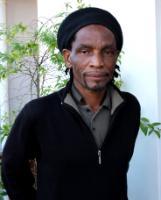
“I need to be able to engage with people who live with and are of the word,” says Lesego Rampolokeng. A self-confessed wanderer, the internationally acclaimed writer, iconoclast and wordsmith is spending three months as a writer-in-residency at Rhodes University as a recipient of the Andrew H. Mellon Foundation fellowship.
In his inimitable ironic style, he says: “I’m a glorified vagabond. I carry my roots on my head, hence the dreadlocks,” referring to his trademark hair. “If I cut them, I’m done.”
Rampolokeng has been working with the Masters in Creative Writing students, creating his own work and collaborating with the English and Drama departments.
The Mellon writer-in-residency is sponsored by the Rhodes research office and the selection of the Mellon fellow is made by the Institute for the Study of English in Africa (ISEA) board, motivated by recommendations from the 14 writers who teach on the MA programme.
These include well-known names like Rian Malan, Ingrid Winterbach, Joan Metelerkamp and Eben Venter, who will be the second Mellon fellow of 2012.
Rampolokeng has also been actively engaged with young writers outside of the MA course, setting aside a few hours every Tuesday for an informal session of sharing and writing.
Rampolokeng grew up in Soweto, a stone’s throw from where the first June 16, 1976 shootings took place. A member of the Black Consciousness movement of the 70s and 80s, he counts Frantz Fanon and American soul poet Gil Scott-Heron as major influences.
“I don’t necessarily agree with their politics but Fela Kuti, for example, was the first artist of social conscience of the so-called Turd World to kick the door down so that others may enter,” he says.
He has written seven collections of poetry and two novels and contributed to William Kentridge’s Faustus in Africa, plus various other multi-media projects.
Among his travels, he spent a few months as a writer in residence in Germany where he published The Second Chapter in Berlin in 2003. These 18 poems appear in his latest anthology Head on Fire: Rants/Notes/Poems 2001-2011 which was launched in Johannesburg in April.
“I spent years roaming around the Schlöss Solitude writer’s retreat, I should have been called Malice in Wonderland,” he quips.
Known for his electrifying live performances, influenced by rap and dub-poetry, he usually recites his poems in a flurry of layered words and rhythms. Steeped in the word of the street, his persuasive percussion-tones rage and pulse, obscure and ironic in turn, then suddenly just as celebratory.
Cuttingly critical of all forms of hypocrisy, he doesn’t hesitate in saying “the Pavlovian experiment is failing South Africa’s people”.
In talking about his roots, he says that he was never encouraged to become a writer. “Nothing at all pointed me in that direction, everything was dead-set in opposition to it. I grew up in a world where it was believed that books lured rats and cockroaches into the house.”
Now, it is clear that the word has chosen him. “I want to reach the core of humanity with the putrefaction that stands between us and the beauty I see. My writing tries to be equal to that process.”
He particularly enjoys teaching ‘unschooled’ writers, affirming that you can’t really teach someone to write, you merely help embolden the voice that already exists.
“I have set a course to share my words with the world,” he says. “My quest is to get souls in communication with each other, I encourage students to challenge and question their own opinions, as well as their supervisors’ .The word is a tool for liberation.”
Story and photo by Anna-Karien Otto
